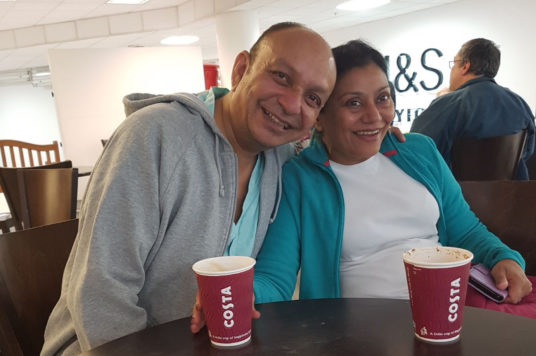Major increase in clinical trial recruitment at St George’s
St George’s recruited over 6,000 patients to clinical trials during 2017/18 – an impressive 24% increase on the previous year.
This far exceeds the recruitment target set with the National Institute for Health Research (NIHR), so is a significant achievement for the Trust, and the result of a major push to make research everybody’s business.
Shrikesh Malde is just one patient at St George’s to be taking part in a clinical trial. Shrikesh is also a member of staff based within our IT department.
Shrikesh, who lives in Croydon and has worked at the Trust for 17 years, suffered a major stroke in January this year, and was transferred to the Hyper Acute Stroke Unit at St George’s for treatment.
He has since been discharged and is undergoing rehabilitation. He is also part of a clinical trial at the Trust involving a GABA that might protects brain cells from further damage, which researchers believe may help speed up patients’ cognitive and motor recovery in the weeks and months following a stroke.
As part of the trial, Shrikesh must take a powder twice a day, and attend hospital once a month for review; both of which he is more than happy to do, with the support of researcher Rita Ghatala.
Shrikesh said: “I didn’t think twice when I was asked to be honest. I think being part of a clinical trial is a great idea – it means I get the treatment I need, but could also mean I benefit from the latest research advances.”
“As part of the trial, neither the doctors or I know whether I am getting the trial drug, or a placebo – but it feels good to know that by taking part in a trial such as this, I could be helping others.”
The Trust is now looking to recruit even more patients to trials during 2018/19, with the aim of enrolling nearly 11,000 people into new projects over the next twelve months – ranging from assessing new drugs and surgical devices to other important ways diagnosis and treatment can be improved.
Dr Daniel Forton, Associate Medical Director and Consultant Hepatologist at St George’s, also leads clinical research at the Trust. He said:
“The fact we have seen such a significant increase in recruitment demonstrates that we are a research hungry organisation, which is fantastic – as it can only benefit patients and staff. Patients may be able to access new and more effective treatments and hospitals that are active in research can provide better quality healthcare. Our staff are highly motivated and want to do more research.”
“We are extremely grateful to our patient populations, who are enthusiastic and willing to take part; plus the staff who carve out time alongside their busy clinical jobs to make studies happen. Our excellent research and development team also play a key role.”
“Patients don’t have to take part in trials, but we want to provide as many opportunities as possible for those who want to – and the figures published this month shows we are heading in the right direction.”
Highlights from the past year at St George’s include:
- Fetal medicine, which recruited 1287 patients into trials during 2017/18 – more than any other team
- Cardiology, who more than doubled their recruitment numbers in 2017/18 compared to 2016/17
- A&E, who recruited more patients than other units in the south London area
- Paediatrics, who secured three research grants during the year – which enhances the Trust’s ability to recruit patients into trials


